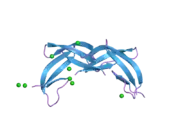Defensin, alpha 6 (DEFA6) also known as human alpha defensin 6 (HD6) is a human protein that is encoded by the DEFA6 gene.[3][4] DEFA6 is expressed in the Paneth cells of the ileum.[5]
Function
The alpha defensins are a family of microbicidal and cytotoxic peptides that defend the host against bacteria and viruses. HD6 has poor antibacterial potency.[6] However, HD6 affords protection against invasion by enteric bacterial pathogens by self-assembly to form fibrils and nanonets that surround and entangle bacteria.[7]
Several alpha defensin genes, including DEFA6, are clustered on chromosome 8.[3]
References
- 1 2 3 ENSG00000285136 GRCh38: Ensembl release 89: ENSG00000164822, ENSG00000285136 - Ensembl, May 2017
- ↑ "Human PubMed Reference:". National Center for Biotechnology Information, U.S. National Library of Medicine.
- 1 2 "Entrez Gene: DEFA6 defensin, alpha 6, Paneth cell-specific (Homo sapiens)".
- ↑ Jones DE, Bevins CL (January 1993). "Defensin-6 mRNA in human Paneth cells: implications for antimicrobial peptides in host defense of the human bowel". FEBS Letters. 315 (2): 187–92. doi:10.1016/0014-5793(93)81160-2. PMID 8417977. S2CID 45099115.
- ↑ Zhao C, Wang I, Lehrer RI (November 1996). "Widespread expression of beta-defensin hBD-1 in human secretory glands and epithelial cells". FEBS Letters. 396 (2–3): 319–22. doi:10.1016/0014-5793(96)01123-4. PMID 8915011. S2CID 22367037.
- ↑ Ericksen B, Wu Z, Lu W, Lehrer RI (January 2005). "Antibacterial activity and specificity of the six human {alpha}-defensins". Antimicrobial Agents and Chemotherapy. 49 (1): 269–75. doi:10.1128/AAC.49.1.269-275.2005. PMC 538877. PMID 15616305.
- ↑ Chu H, Pazgier M, Jung G, Nuccio SP, Castillo PA, de Jong MF, et al. (July 2012). "Human α-defensin 6 promotes mucosal innate immunity through self-assembled peptide nanonets". Science. 337 (6093): 477–81. Bibcode:2012Sci...337..477C. doi:10.1126/science.1218831. PMC 4332406. PMID 22722251.
Further reading
- Szyk A, Wu Z, Tucker K, Yang D, Lu W, Lubkowski J (December 2006). "Crystal structures of human alpha-defensins HNP4, HD5, and HD6". Protein Science. 15 (12): 2749–60. doi:10.1110/ps.062336606. PMC 2242434. PMID 17088326.
- Wu Z, Ericksen B, Tucker K, Lubkowski J, Lu W (September 2004). "Synthesis and characterization of human alpha-defensins 4-6". The Journal of Peptide Research. 64 (3): 118–25. doi:10.1111/j.1399-3011.2004.00179.x. PMID 15317502.
- Mallow EB, Harris A, Salzman N, Russell JP, DeBerardinis RJ, Ruchelli E, Bevins CL (February 1996). "Human enteric defensins. Gene structure and developmental expression". The Journal of Biological Chemistry. 271 (8): 4038–45. doi:10.1074/jbc.271.8.4038. PMID 8626737.
- Bevins CL, Jones DE, Dutra A, Schaffzin J, Muenke M (January 1996). "Human enteric defensin genes: chromosomal map position and a model for possible evolutionary relationships". Genomics. 31 (1): 95–106. doi:10.1006/geno.1996.0014. PMID 8808285.
- Eisenhauer PB, Harwig SS, Lehrer RI (September 1992). "Cryptdins: antimicrobial defensins of the murine small intestine". Infection and Immunity. 60 (9): 3556–65. doi:10.1128/IAI.60.9.3556-3565.1992. PMC 257361. PMID 1500163.
- Huttner KM, Selsted ME, Ouellette AJ (February 1994). "Structure and diversity of the murine cryptdin gene family". Genomics. 19 (3): 448–53. doi:10.1006/geno.1994.1093. PMID 8188287.
External links
- PDBe-KB provides an overview of all the structure information available in the PDB for Human Defensin-6
This article is issued from Wikipedia. The text is licensed under Creative Commons - Attribution - Sharealike. Additional terms may apply for the media files.


